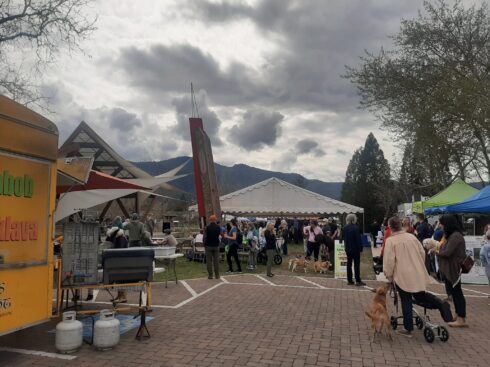The United Nations Club of Southern Oregon University and Ashland Peace House sponsored a two day conference Wednesday and Thursday entitled “Debunking the ‘Clash of Civilizations’: Understanding Islam, Islamophobia, and the Middle East,” a conference that featured speakers from a wide range of cultural backgrounds.
“We’ve been planning this event for several months. We tried to get a variety of speakers, a huge variety for a huge topic,” said Kathleen Gamer, secretary general of the United Nations Club and one of the event organizers.
“This is very necessary at this time,” Gamer said.
She recounted an incident that happened while she and other event organizers were posting flyers for the conference around shops and businesses in Ashland. One shop refused to let them post the flyer in their window. According to Gamer, the shop owners explicitly said their reason for refusing to host the flyer was because they hated Muslims.
Gamer declined to give the name of the store.
Evan Lasley, president of the United Nations Club and a member of the board of directors at Ashland Peace House, explained what was meant by “clash of civilizations” and why the conference was out to debunk the concept.
“The ‘clash of civilizations’ idea comes out of work done in the 1990s on democracy in the West, which said that Islam is incompatible with democracy,” Lasley said. “There’s a number of repressing issues. One of them is the Arab Spring, which has potential for a real counter-argument to the clash of civilizations. There is also the myth of the Iran nuclear program.”
The first day of the conference focused on introducing the basics of the Islamic religion and addressed what some scholars and commentators have called “Islamophobia,” the fear of Islam.
For the second day of the conference, speakers tackled more in-depth and complex issues concerning the history and politics of the Middle East in relation to Islam and its points of tension with Western countries.
Jon Mandaville, a professor of history at Portland State University and a fluid speaker of Arabic, started the second day of the conference with a lecture explaining the historical colonial background of the Arab Spring controversy. He identified imperialism under the Ottoman Empire just prior to World War I and the subsequent nationalism that pulled the diversity of the Empire apart as the two forces by which to make sense of much of the current scene in the Middle East.
Herbert Rothschild, chair of the Board of Directors at Peace House, and local Ashland author Michael Niemann next gave a joint presentation on the nuclear tensions between Iran and Israel.
Rothschild predicted that a third World War will begin in about a dozen years if current trends continue. He gave an overview of the science of fission bomb, explaining that the Uranium-235 isotope can have its atoms split to release large quantities of energy, while the much more common Uranium-238 isotope is non-fissionable.
The only way to extract U-235 out of nature to create a fission bomb, Rothschild said, was to utilize a device called a centrifuge, which rotates objects around a fixed axis at very high speeds. Iran does not have nearly enough power in their enrichment facilities and reactors to generate the centrifuge strengths required to make fission bombs, Rothschild said. At the Natanz enrichment facility, for example, uranium has been enriched to 3.5 percent, far below the required 95 percent level.
Niemann talked about the lack of evidence for claims made in recent years that Iran is reprocessing spent nuclear fuel for new plutonium-based weapons at the Fordow Fuel Enrichment Plant and at the Natanz plant. There are doubts about what Iran is doing with uranium, however. Much ado has been made over the fact that Iran is not subject to the supervision and oversight of the watchdog organization International Atomic Energy Agency, an independence that Rothschild had said was their legal right. But Niemann pointed out that the IAEA say in their own reports that the nature of these conclusions is tentative at best.
Rothschild wrapped up the double presentation with a discussion of the formation of nuclear-weapons-free zones, or NWFZs, in the Middle East, the first of which were established in 1974.
Israel was at that time the only Middle Eastern state that possessed nuclear weapons, and they remain the sole possessor today. According to Rothschild, Israel rejected calls to sign the Nuclear Non-Proliferation Treaty and has refused to place its nuclear facilities under IAEA inspection and supervision as mandated by UN Security Council Resolution 487, adopted unanimously in 1981.
UN Security Resolution 687, passed ten years later, demanded Iraqi disarmament within the context of the “establishment in the Middle East of a zone free of such [mass destruction] weapons.”
According to Rothschild, an unverified allegation that this resolution was violated is what led the Bush Jr. administration to justify its 2003 invasion of Iraq.
In the end, Rothschild argued, reason-driven diplomacy is the best solution to conflict.
“The clash of civilizations is nonsense,” Rothschild concluded. “If someone’s angry with you, just ask why they’re angry. If you’re angry at me, I want to know why. Maybe I really am in the wrong.”
Reza Mohajerinejad is a student activist currently attending San Francisco State University and one of the organizers of student uprising in Iran in 1999.
He gave a lecture entitled “The Importance of Iran in the Middle East,” about a series of election protests in Iran that followed the disputed the 2009 presidential election of Mahmoud Ahmadinejad in that country. These protests have come to be known as the Green Revolution.
Mohajerinejad is the author of a 2010 book entitled “Live Generation: Iran’s 1999 Student Uprising that Opened the Door for Secular Democracy.”
Ashour Abdulaziz, a graduate student studying applied linguistics at Portland State University, brought an insider’s perspective to his lecture on “Libya and the Arab Spring.”
Abdulaziz is a native of the town of Ghat in Libya, located in North Africa, and he began his talk with a brief discussion of the people and culture of that area.
He moved into a more substantial discussion of Libya’s political history, covering the period from the 1934 division of Libya into three separate provinces up to the uprising in 2011 of the citizenry against Colonel Muammar Gaddafi, who in 1977 dissolved the Libyan Arab Republic and became a dictator.
Abdulaziz talked about how Libya overcame the ravages of civil war that resulted from the uprising against Gaddafi to experience the first democratic elections in the country’s history in July 2012.
Abdulaziz said he missed out on being an eyewitness and participant in the elections, because he was in Morocco giving a conference presentation entitled “The First Libyan News Broadcast in Tamazight: Examining the Consequences of Libya’s Past Language Policies.”
Abdulaziz’s research on the very first media broadcast in a language other than the officially sanctioned standard Arabic is also the subject of his graduate thesis.
After the overthrow of Gaddafi in 2011, the long-suppressed Berber language constituted much of the new forms of Libyan free speech and expression that exploded, he said, most notably in street graffiti.
“Berber was a forbidden language,” said Abdulaziz. “Even at parties, if you went to hear a singer who was Amazigh [non-Arabic or Berber ethnicity], you were imprisoned. An Arabic entertainer was just fine.”
He ended his talk with an overview of the current government scene in Libya, governed by Prime Minister Ali Zaidan. Abdulaziz said it may take Libya many years to fix what Gaddafi destroyed over the course of his 42-year rule.
Kanaan Kanaan, a visual artist born and raised in a Palestinian refugee camp in Amman, Jordan, gave a presentation entitled “American Crocket Foreign Policy in the Middle East.”
The subject of the talk was the tense relationship between Israel and Palestine and a large portion of it was spent clearing up misconceptions surrounding Arabs, Semitic peoples, and Muslims.
For example, Kanaan pointed out that not all Muslims are Arabic and that the country with the highest population of Muslims is Indonesia, which is not a Middle Eastern country. With the aid of a map, he showed the vastness of the Muslim world to demonstrate how untenable it is to paint all Muslims with the same brush.
“The West likes to put labels on everything, even if it’s wrong,” he said. “We have to identify everything, and we divide and conquer to do that.”
Kanaan spent the latter half of his talk with a harsh critique of American foreign policy and American journalism.
“The American media is for profit entertainment business,” he said. “There is no journalist integrity to be found in America. When journalists sit down with presidents and other politicians, they don’t ask any meaningful questions.”
A woman in the audience challenged Kanaan on this point in the middle of his talk, saying that he was committing a vast over-generalization. She cited the prominent Indian-American journalist Fareed Zakaria as a counterpoint to Kanaan’s brushing of all American journalists as incompetent and superficial.
Kanaan admitted he was over-generalizing but defended the generalization as valid.
He charged the American media with disconnecting Americans from a true understanding of Arab people. Kanaan said this media distortion is a symptom of the United States’ vested interest in creating a new enemy to fight in wars that are more profitable than peace. The collapse of the Soviet Union in 1988 brought an end to the Cold War, and Kanaan said weapon-makers in industrialized Western countries “itched for a new fight.” Kanaan cited Section V of a 2000 report by the Project for a New American Century, entitled “Creating Tomorrow’s Dominant Force” as an encapsulation of America’s search for a new enemy.
The term “terrorist” was a convenient catch-all identifier for potential new enemies to which to apply the money-making war machine, Kanaan said. He asked whether anyone really knows what a “terrorist” is. He said that prior to Sept. 11, he would introduce himself at his lectures as “Kanaan the Terrorist” in mockery of the stereotyping of all Arabs as terrorists.
“The elusive nature of terrorism changes like an amoeba,” he said.
He ended his talk by emphasizing the importance of allowing foreign countries to handle their own affairs without outside intervention and interference.
He coined the term “hypocrisy-democracy” to refer to the attempt by Western countries to export democratic principles to other countries. He pointed out the irony of the fact that while Israel is currently the recipient of more U.S. aid than any other country in the world, Israeli nevertheless criticizes American government more freely and openly than do American citizens.
Kanaan ended his presentation by adding that Israel spies on the U.S. more than they spy on any other country, even more than the Soviet Union did.


